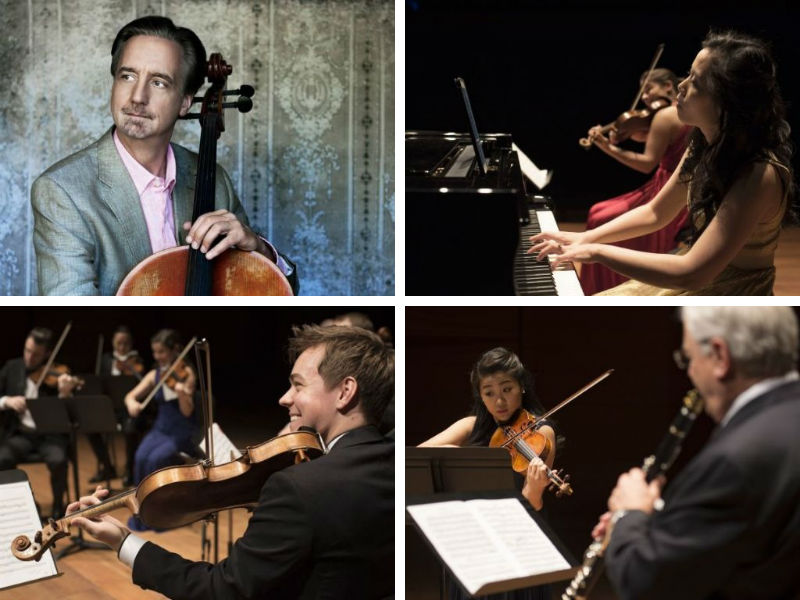Milestones: The Chamber Music Society of Lincoln Center Celebrates its 50th Anniversary at Rackham

The Chamber Music Society of Lincoln Center (CMS) is celebrating its 50th anniversary, a milestone. So, co-artistic director and cellist David Finckel says it was fitting that CMS begins this season with milestones in the art of chamber music. “We identified pieces of music that have somehow influenced the way chamber music evolved,” he says.
The program CMS will bring to Rackham Auditorium in Ann Arbor on October 11 includes four of these works: Harry Burleigh’s Southland Sketches (1916), Antonin Dvořák’s Quintet for Two Violins, Two Violas, and Cello in E-flat Major, Op. 97 (1893), Leonard Bernstein’s Sonata for Clarinet and Piano (1941), and Aaron Copland’s Appalachian Spring (1944), originally called Ballet for Martha (Graham).
“The story of Dvořák in America is colorful and entertaining,” says Finckel.
Turns out, it is Burleigh’s story, too.
“Dvořák came to direct the National Conservatory in New York City at the request of its director, Jeanette Thurber,” says Finckel, explaining that Thurber hoped the Czech composer would help the United States find its own musical voice. At the time, performers here were only recording European music. Carnegie Hall was opening simultaneously -- with the music of Tchaikovsky.
In 1893, Dvořák spent the summer in the tiny town of Spillville, Iowa, a community of Czechs and Bohemians. “Czech was the language spoken on the streets. Dvořák brought his whole family out there,” Finckel reports, adding that about every week, a traveling troupe of Native Americans would come through and perform. “He was so inspired by the American landscape, traveling by train over the plains, he started writing a string quartet [and then] he completed a string quintet that sounded like American folk music.” The second piece on the program is that quintet.
Back in New York, at the National Conservatory, Dvořák encountered Burleigh, an African-American scholarship student who sang spirituals to him. “He loved 'Go Down Moses' and 'Nobody Knows the Trouble I’ve Seen.' Along the way, he became convinced America’s true musical voice lay in the African and Native American music.”
Listening to the baritone affected Dvořák’s later work. "Goin' Home" and "Swing Low, Sweet Chariot," for instance, would influence D’s Symphony no. 9 in E minor. Burleigh would begin composing after studying with Dvořák. His 200-plus art songs influenced the development of this art form. Southland Sketches, which begins the evening, was the first work by an African American composer from America to have been published and distributed internationally.
In the second half of the program, CMS will present pieces from a later period, including “Bernstein’s brilliant and witty clarinet sonata that he wrote at age 23," Finckel says. "You can hear the Bernstein of the future, the Broadway Bernstein in it.” CMS will bring back clarinetist David Shifrin, who was the Society's artistic director from 1992-2004 and has been the principal clarinetist of the Cleveland Orchestra for many years.
Aaron Copeland’s piece will take listeners to the American countryside. The piece was originally written to be danced by Martha Graham, who appeared when it was first performed.
Audiences will remember Finckel from his performances with the Emerson String Quartet as well as with CMS. Although he began co-directing CMS in 2004, he played his last concert with Emerson in 2012 after 34 seasons.
A recipient of Musical America’s Musician of the Year award, Finckel continues to juggle multiple roles today. In addition to serving as co-artistic director and cellist for CMS, he performs in other groups, runs an internet-based recording company, co-directs Music@Menlo -- Silicon Valley’s acclaimed chamber music festival and institute -- serves as artistic director for Chamber Music Today in Korea and a chamber music workshop at the Aspen Music Festival and School. He teaches master classes occasionally at Julliard and Stoney Brook, too, and provides free online cello lessons.
This concert is performed by 13 members of CMS: Kristin Lee, Chad Hoopes, Arnaud Sussmann, and Angelo Xiang Yu, violin; Paul Neubauer and Matthew Lipman, viola; Finckel and Nicholas Canellakis, cello; Anthony Manzo, bass; Ransom Wilson, flute; David Shifrin, clarinet; Marc Goldberg, bassoon, and Gloria Chien, piano.
Davi Napoleon is a freelance journalist and theater historian. Her book, Chelsea on the Edge: The Adventures of American Theatre, explores the onstage triumphs and offstage turmoil of a theater dealing with cuts to arts funding.
The Chamber Music Society will perform on Friday, October 11 at 8 pm at Rackham Auditorium, 915 E. Washington St., Ann Arbor. Visit ums.org for tickets and more details.


































